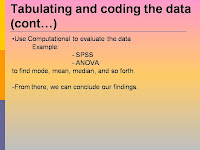

EDU 702 – RESEARCH METHODOLOGY
By Dr Teoh Sian Hoon
Summary by Norela Elias, Student ID 2009737225
Educational Management and Leadership
Qualitative Research
It is known as a method of inquiry which it can suit many other academic disciplines
in market research and also in other context. The understanding of human behaviour and why do human act in such a way is what a qualitative researcher will look into.
Norela Binti Elias (for EDU 702)
A Study On Development of Communication within Multicultural Preschool Children in Malaysia.
Variable of Study : Development of Communication
Setting : Malaysia
Subjects of study : Multicultural Preschool children
Literature review
Introduction
Communication involves the sharing of ideas and information. It is also defined as an interaction between two people in which something is exchanged. Emotional competence is the key to strong preschool social skills (Denham 1997).
Communication is a learned skill. Most people are born with the physical ability to talk, but we must learn to speak well and communicate effectively. Speaking, listening, and our ability to understand verbal and nonverbal meanings are skills we develop in various ways.
COURSE INFORMATION
Code : EDU 702
Course : Research Methodology
Level : Masters
Credit Unit : 3
Contact Hour : 3
Course Status : Core
Prerequisite : None
Description
This course introduces learners to the basics of educational research. The course focuses on the concepts and philosophies underlying academic research in the field of education. It aims at developing students' understanding of research methodology with emphasis to aspects such as the identification of the research problem and the formulation of research objectives and research questions. It also involves aspects such as research strategies, research design, data collection and data interpretation techniques. Upon completion of this course, students are required to have the ability to define a research problem and prepare a research proposal. This course is compulsory for all students who intend to undertake a post graduate degree at the Master's level. The learners are expected to do a lot of independent and critical reading of research journals and conducting research.